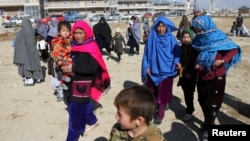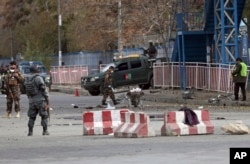The United Nations warned Wednesday that days of heavy fighting in parts of central-eastern Afghanistan has worsened humanitarian conditions, and urged warring parties to ensure safe passage for civilians attempting to leave the affected districts.
The hostilities between the Taliban, supported by local Pashtun communities, and pro-government Shia Hazara militias broke out in early November in the Khas Uruzgan district, Uruzgan province, before spreading to the Jaghuri and Malistan districts in the embattled neighboring Ghazni province.
Scores of Afghan security forces and insurgent fighters have been killed, and the conflict has escalated since Saturday, with intensified ground operations and airstrikes by pro-government forces.
"The situation within the affected districts is chaotic, with families moving repeatedly in search of safety," said the U.N. humanitarian agency in a statement. It blamed "increasing inter-communal tensions" for sparking the deadly conflict.
Afghan civilians also have suffered casualties, but the U.N. agency would not immediately offer any figures. It lamented reports from the war zone that private houses have been burned and civilian vehicles stolen or confiscated in violation of international humanitarian laws.
"Roads connecting Jaghuri and Malistan to the provincial capital of Ghazni have reportedly been blocked ... leaving people in siege-like conditions with no access to health facilities and limited ... food, fuel and medicine," the U.N. agency noted.
Displaced families abandoning their homes are exposed to harsh winter conditions. Hundreds of refugee families have arrived in neighboring Bamyan and Maidan-Wardak provinces, while some moved into Kabul.
Aid workers said supply routes to Jaghori and Malistan remain closed, while telecommunications networks are interrupted, affecting the availability of fuel, food and medicine in local markets.
Relief authorities have registered 1,000 displaced families in the provincial capital of Ghazni over the past two days, who are living in schools, mosques and homes of local families. The U.N. agency said that up to 4,000 families reportedly are headed toward Ghanzi city and Kabul.
Afghan Defense Minister Tariq Shah Bahramee, while briefing lawmakers Wednesday, acknowledged that government forces with limited resources were dealing with a "high-level of security threats" insurgents are posing in nine provinces, including Ghazni and Uruzgan.
Afghan security forces have suffered heavy casualties in recent months, and they continue to face increasingly deadly battlefield attacks from the Taliban.
President Ashraf Ghani admitted Monday that Afghan security forces have lost more than 28,500 personnel since 2015 while battling the Taliban, but he denied suggestions the insurgent group was in a winning position. The Taliban controls or hotly contests nearly half of Afghanistan's districts.

